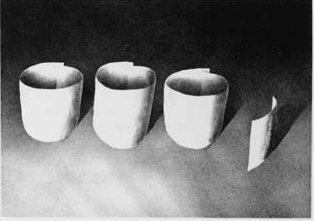Ed Ruscha
dal 21/9/2006 al 21/1/2007
Segnalato da
21/9/2006
Ed Ruscha
Norton Simon Museum, Pasadena
Ooo: Early Prints

Ooo: Early Prints
One of today’s most influential and celebrated
American artists, Ed Ruscha has been an avid printmaker for
more than forty years. Ooo: Early Prints by Ed Ruscha, an
intimate exhibition at the Norton Simon Museum, features his
early experiments with lithography at the Tamarind Lithography
Workshop in Los Angeles in 1969. From the single-word Ooo and
Eye prints to Hollywood in the Rain, a landscape of the iconic
Hollywood sign, this selection of fourteen graphic works
demonstrates Ruscha’s interest in language and popular culture
and his masterful ability to use text as the subject of his works.
Born in Omaha, Nebraska, in 1937, Ruscha moved to Los Angeles in 1956 to study commercial
art at the Chouinard Art Institute. His studies, as well as his apprenticeship with a book publisher,
introduced him to the fundamentals of working on a press and making prints, and he brought the
themes of lettering and illustration to his early paintings. His first work with collaborative
printmaking came at the suggestion of art collector Audrey Sabol in 1966, and Ruscha became
intrigued by the possibilities of translating ideas and images across different media. This became
a primary motif for the artist for many years to come.
Ruscha’s interest in printmaking coincided with the development of several important lithographic
workshops in the Los Angeles area. In particular, the Tamarind Lithography Workshop,
established by June Wayne in 1960, was a vital center for sharing printmaking techniques and
encouraging collaboration between artists. In the tradition of European printing ateliers, Tamarind
offered a creative environment where emerging and experienced artists worked side by side on
projects. For Ruscha, his fellowship at Tamarind led to a lifelong interest in the expressive
possibilities of printmaking.
The works on view in the exhibition demonstrate how the artist uses
single words as visual and linguistic “found" objects. Ruscha chooses
words that are powerful and suggestive, with an engaging phonetic
quality. In works such as Adios (1969), he renders the words as if they
were formed from liquid, while in Eye (1969) Ruscha forms the shapes
seemingly out of smoke. This trompe l’oeil effect emphasizes their
symbolic as well as physical weight (or weightlessness). Through finely
drafted art and a rich medium, Ruscha found the means to investigate the transformative quality of language.
Ooo: Early Prints by Ed Ruscha is organized by Michelle Deziel, assistant curator, Norton Simon Museum, with assistance from Christine Knoke, associate curator, Norton Simon Museum.
About the Norton Simon Museum
The Norton Simon Museum is known around the world as one of the most remarkable private art
collections ever assembled. Over a thirty-year period 20th-century industrialist Norton Simon
(1907-1993) amassed an astonishing collection of European art from the Renaissance to the 20th
century and a stellar collection of South and Southeast Asian art spanning 2,000 years. Among
the most celebrated works he collected are Branchini Madonna, 1427, by Giovanni di Paolo;
Madonna and Child with Book, c. 1502-03, by Raphael; Still Life with Lemons, Oranges and a
Rose, 1633, by Francisco de Zurbara'n; Portrait of a Boy, Presumed to Be the Artist's Son, Titus,
c. 1645-50, by Rembrandt van Rijn; Mulberry Tree, 1889, by Vincent van Gogh; Little Dancer
Aged Fourteen, 1878-81, by Edgar Degas; and Woman with a Book, 1932, by Pablo Picasso.
Highlights from the Asian collection include the bronze sculptures Buddha Shakyamuni, c. 550,
India: Bihar, Gupta period, and Shiva as King of Dance, c. 1000, India: Tamil Nadu; and the gilt
bronze Indra, 13th century, Nepal.
In 1974, Norton Simon and a reorganized Board of Trustees assumed control of the Pasadena
Art Museum, taking up management of its building and incorporating its important collection of
20th-century European and American art with his own outstanding collection. Highlights from the
PAM collection include the Galka Scheyer Blue Four Collection, a body of works by artists Lyonel
Feininger, Paul Klee, Alexei Jawlensky, Vasily Kandinsky and others assembled by art dealer,
scholar and muse Galka Scheyer; post-war American art, particularly from Southern California-
based artists including John Altoon, Larry Bell, Wallace Berman, Bruce Conner, Richard
Diebenkorn, Llyn Foulkes, Sam Francis, George Herms, Robert Irwin, and Ed Ruscha; and a
photography collection.
Location: The Norton Simon Museum is located at 411 West Colorado Blvd. at Orange Grove
Blvd. in Pasadena, California, at the intersection of the Foothill (210) and Ventura (134) freeways.
Hours: The Museum is open every day except Tuesday, from 12:00 p.m. to 6:00 p.m., and 12:00
p.m. to 9:00 p.m. on Friday.
Admission: General admission is $8.00 for adults and $4.00 for seniors. Members, students with
I.D., and patrons age 18 and under are admitted free of charge. Admission is free for everyone on
the first Friday of every month from 6:00 p.m. to 9:00 p.m. All public programs, unless stated
otherwise, are free. The Museum is wheelchair accessible.



